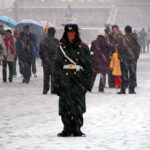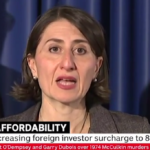Prime Minister, this Asian Century is so last century
It’s not the first time Australians have heard about how important Asia is to our future, but when PM Julia Gillard released a road map China was the main focus. Stephen Kirchner says we still have some unfinished business in the region.
The Asian Century white paper comes almost 23 years to the day after a remarkably similar report was handed to then prime minister Bob Hawke – Ross Garnaut’s Australia and the Northeast Asian Ascendancy.
In October 1989, Japan’s so-called "bubble" economy was at its peak. The Soviet Union was still a going concern. East German leader Erich Honecker had just resigned and the Berlin Wall would fall in a matter of days.
Despite the very different geo-political backdrop, Asia already loomed very large on Australia’s economic horizon. The Garnaut report clearly foresaw that Asia’s share of world output and trade would rise and that Australia was well-positioned to capitalise on Asia’s ascendancy.
Yet Garnaut also sounded a cautious note, arguing that much depended on the prospects for economic reform in Japan and China. In the absence of further reform, he warned, China would "remain a low-income developing country".
Japan’s economy entered a two-decade rolling recession as a result of extensive misallocation of capital wrought by its iron triangle of rent-seeking bureaucrats, politicians and business.
The late 1990s Asian crisis temporarily obscured Asia’s gains. In 1999, Gerald Segal wrote an article in Foreign Affairs posing the serious question, "Does China Matter?"Global commodity and Australian export prices began the 21st century in a profound slump.
Although Asia’s rise was and remains subject to considerable uncertainty, Garnaut was clear about what Australia needed to do to capitalise on this emerging shift in the world’s economic centre of gravity.
He argued that Australia must "remove all protection by the beginning of the 21st century".
The report recommended an accelerated timetable for winding back tariffs and other forms of protection and helped to set the stage for the 1991 tariff cuts in the middle of a recession.
By the beginning of the 21st century, Australia was also supposed to "have joined the small, high-wage industrial economies of Europe in avoiding all anti-dumping actions".
But a decade into the 21st century, Garnaut’s vision of an Australia purged of protectionism remains unrealised.
The Productivity Commission’s most recent Trade and Assistance Review identified nearly $18 billion in gross industry assistance, including nearly $9bn worth of tariff protection in 2010-11.
The Asian Century white paper is less ambitious than the Garnaut report, committing only to "continue to reduce Australian tariffs through scheduled reductions and negotiated commitments as part of World Trade Organisation and other trade agreements".
The government and opposition are committed to enhancing rather than abolishing Australia’s anti-dumping regime at the expense of Australian consumers and the majority of domestic producers.
Garnaut recommended that the national-interest guidelines administered by the Foreign Investment Review Board "should be made explicit and public to avoid the appearance of arbitrary or discriminatory application".
Instead, our regulatory regime for foreign direct investment remains confused as a result of ad hoc decision-making and the exercise of ministerial discretion, while the opposition proposes to increase scrutiny of foreign direct investment in agriculture.
Garnaut was also concerned that in relation to immigration "Australians in public life should be aware of the advantages to Australia of maintaining bipartisan approaches". Upsetting such bipartisanship "should not be undertaken by responsible political leaders without thorough regard for the consequences".
Yet, in recent years, politicians have sought electoral advantage in debating the size of the immigration program while finding the least hospitable and most expensive approach to dealing with those fleeing political and economic repression abroad.
Garnaut singled out "a weakness in analytic capacity in Canberra" in relation to Asia. But the more serious problem in recent years has been the lack of political will to see through fundamental economic reforms that were in Australia’s interest, regardless of developments in Asia. Australia’s political class is now far less committed to fundamental economic reform than it was in 1989.
Before we consider the agenda of the Asian Century white paper, it might be worth revisiting the unfinished economic reform agenda of the previous century.
Stephen Kirchner is a research fellow at The Centre for Independent Studies and a senior lecturer in economics at the University of Technology Sydney business school.
















MartinLewis
November 13, 2012 at 5:56 pm
FOREIGN investors snap up Australia like cheap asian women.
FOREIGN investors have snapped up tens of billions of dollars in prime agricultural land and rural enterprises, triggering concerns Australia is literally selling off the farms and hundreds of other companys.
Wake Up Australia!